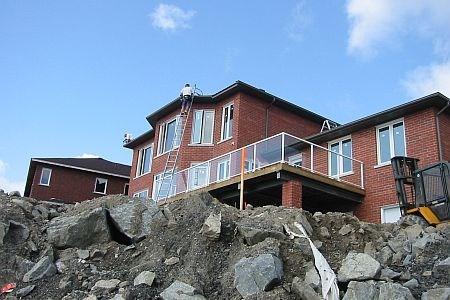Characterized in 2008 by unbridled optimism and soaring prices, Sudbury's real estate market has since become marked by hesitation and caution, taking a toll on sales and new construction projects.
"I think this year it's very 'wait and see,'" says Catherine Bernier, president of the Sudbury Real Estate Board, who says that sales are still brisk and remain comparable to two years ago.
"It's all about supply and demand, and right now we don't have very much of either."
Residential sales through to the end of July reached 1,076, as compared to 1,582 to the same period in 2008. However, average prices have scarcely dropped from $218,000 in 2008 to $202,000 this year.
Many buyers are waiting months at a time before buying in the hopes that the strike will influence housing prices, something that has yet to occur.
Listings have dropped six per cent from the same time in 2008, to 3,570.
What's more, sales volumes are down 37 per cent, dipping from $69-million to $43-million, the result of fewer sales of bigger and more expensive homes, says Bernier, who also serves as broker of record with U-View Realty.
Activity remains strong in the New Sudbury, Minnow Lake and Garson areas. However, things have quieted somewhat in the formerly red-hot Val Caron area, where 430 homes were listed last year as compared to the 366 listed thus far in 2009.
Bernier chalks the hesitation up to jobs shed through late 2008 and early 2009.
Tighter lending rules for homebuyers are also a factor, as the 100-per-cent financing, 40-year amortization seen last year has been changed by the Canadian Mortgage and Housing Corporation. Now, amortization is over 35 years, and buyers must put at least 5 per cent down. This makes things more difficult for people who have owned their home for a few years, as they have very little equity built up and can't necessarily afford to sell.
Those difficulties are also putting the pinch to new home construction, which is currently "not very good, and it's very slow," according to Paul Corsi, president of the Sudbury & District Home Builders Association.
Home construction starts are down by at least 75 per cent, though Corsi says the solution is a simple one: "If you want a large number of new construction (projects), the mines have to come back."
What's more, half the homes under construction are now being pursued by private builders rather than registered contractors. This rare statistic is likely due to the number of skilled labourers who have found themselves laid off and are looking to make use of their talents on their own land, rather than having to pay someone else, Corsi says.
This sinking level of demand is forcing some builders to diversify and begin taking on work for additions, decks and other projects they might not have otherwise considered.
"You take some of the builders who usually do 30-40 homes a year, and all of a sudden they're down to three or four, so they have all those people they're employing and they're trying to keep them busy, but they've having a hard time. I know a lot of the bigger ones have laid off quite a few people, unfortunately."
Work on high-end homes for J. Corsi Developments Inc. at the appropriately titled Corsi Hill is also seeing some slowdown, where plans for an additional phase of new homes are being re-examined. Two permits are currently in place, with plans for another two by the end of the year; in 2008, that number sat at 15.
A condominium project had also been on the books for Corsi, but those plans have also been put on hold in the wake of the economic downturn.
Corsi also laments the eventual impact that development charges, enacted in early July 2009 by city council, will have on the already struggling local homebuilding industry.
The new bylaw will gradually phase increased fees on residential housing from $3,079 to $13,808 by 2012. Council argued for the increase on the basis that heightened charges would not hinder future growth, but Corsi disagrees, labelling the extra amount a "deal-breaker" for buyers who already hedge on purchasing new homes for the sake of a few dollars.
Some optimism remains, however, as Corsi and other builders are moving homes that were started last year and completed through early 2009. This inventory and other assorted projects should help to carry local homebuilders through to 2010, when better times are expected.
"We're looking at this very cautiously, but we're positive that most people can pull through to next year."
www.sudburyrealestateboard.on.ca
www.sudburyhomebuilders.com
www.jcorsi.com




